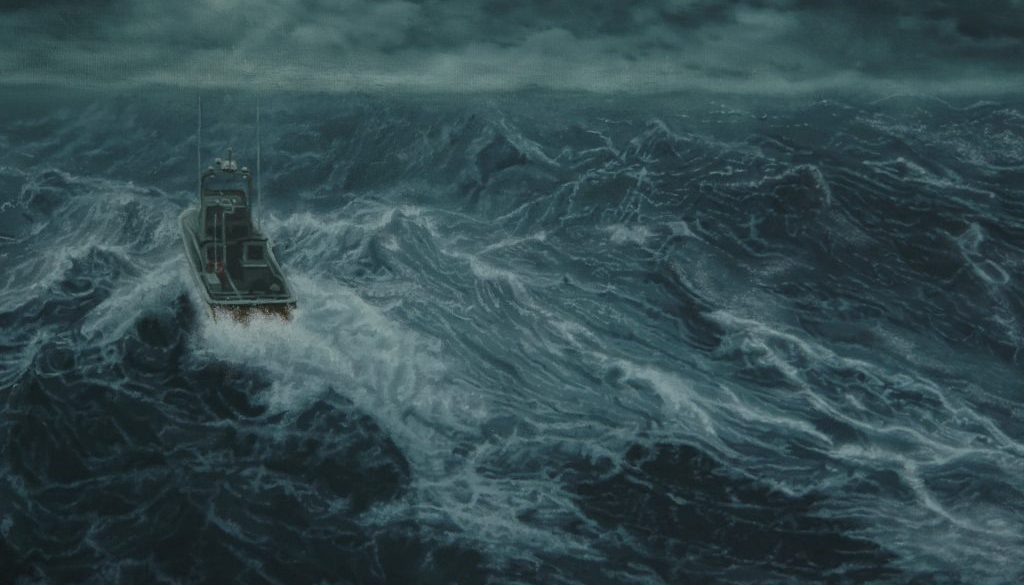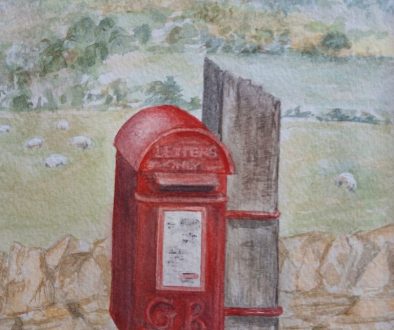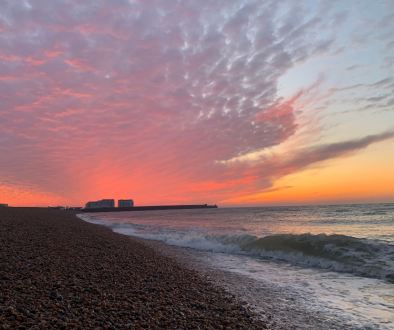Faith in three dimensions
This was my last sermon at St Marks. The gospel reading was Matthew 14:22-33.
We are never out of Jesus sight or reach even when it feels like we are. At the at beginning of this passage Jesus is totally involved in the disciples’ situation even when he seems far off, out of sight, and they feel alone in their situation:
Jesus “went up on a mountainside by himself to pray. Later that night, he was there alone, and the boat was already a considerable distance from land, buffeted by the waves because the wind was against it. Shortly before dawn Jesus went out to them, walking on the lake.” (V.22-25)
Jesus is praying. He sees their situation. He comes to them amid their struggle. Jesús hasn’t changed. We read in Hebrews that the risen and ascended Jesus “lives to intercede for us”. He (the Son of God) is praying for us. That is an amazing truth. He sees our situations even when we cannot see him or feel his presence, and he is right with us by his Holy Spirit. He comes to us in the storm.
As this passage unfolds, we see how faith works. It has three dimensions as we will see. Each dimension of faith is a way that God frees us from that desperate feeling of being trapped by our weakness and fears.
First, faith is simply a decision. A choice that we can make at any time however late in the day or situation it feels.
“When the disciples saw him walking on the lake, they were terrified. “It’s a ghost,” they said, and cried out in fear. immediately said to them: “Take courage! It is I. Do not be afraid.”” (V.26-27)
What Jesus is saying is that the disciple doesn’t have to work up faith, but rather simply take courage. Why? Because of whom Jesus is and that he is with them. It takes courage because it is always a choice. We can always look at circumstances or ourselves instead of Jesus.
Believing in, looking to Jesus, is the essence of the life for which we were made. John concludes his Gospel: “These are written that you may believe that Jesus is the Christ. the son of God. And that by believing, you may have life in his name”.
Crucially, our choosing faith is not a decision based on our circumstances, but on the nature of God. His love and his sovereignty. When Jesus comes to the disciples on the lake, their circumstances have not changed yet. The storm is still raging they are still stuck in the boat paddling just to stay still. But with Jesus’ presence everything is different. It makes possible the decision of faith. “Take courage, it is I”.
This matters because if we can discover that we can make this decision for faith in Jesus no matter what we are facing, it means that we can know the peace and freedom from fear that God wants for each one of us.
A man called Nick was born without arms or legs. When I first saw him I was so upset for him. I thought he was so brave to keep going and to smile. But as he spoke, I realised that he was the most purpose-filled, joyful, and free person that I had ever seen. He is living proof that we can take Jesus at his word: “Take courage, it is I”. He said something that really stuck with me:
“The devil doesn’t care that he has my arms and legs. He cares if he can have my joy.”
The devil cannot have Nick’s joy because Nick decided as a teenager to trust Jesus that his life was not a tragic one but s gift as much any life. That is why he is so free. He has discovered the reality of choosing life not feeling it is dependent on circumstances. But rather a decision. We may still be on that journey towards this kind of freedom and joy. I know I am. But when I see it so genuinely and authenticate in a man like Nick, I know how real it is. Even though we cannot see him like the disciples could, he is no less with us by his spirit, to help us make that choice to trust him completely. Faith is a decision.
Now, there is a vital distinction that we need to see if we are not to misunderstand. When I say that faith is simply a decision that we can make no matter what our circumstances are, I am not saying this should involve us in some sort of unreal denial of our situations and feelings.
Some of the greatest statements of faith in the Bible come in the context of pain and confusion. In total suffering Job says: “Though he slay me, yet will I hope in him”. In utter confusion Habakkuk says: “Though the fig tree does not bud and there are no grapes on the vine…still I will rejoice in the Lord, I will be joyful in God my Saviour.” These statements of faith are not based on circumstances but a decision, a choice to trust in God no matter what. But this is nothing to do with denial, pushing down emotions, or pretence.
Job and Habakkuk, like David in the Psalms are brutally real with God about their situations. Through this gritty honesty and resolute faith, they discover a freedom to know that God is faithful, and hope is real. Job says amid everything that has gone wrong in his life: “Oh that my words were recorded, that they were written on a scroll, that they were inscribed on lead, engraved in rock forever. I know that my Redeemer lives, and that in the end he will stand upon the earth … I will see him with my own eyes.”
The second dimension of faith is that it is an action.
“Lord, if it’s you,” Peter replied, “tell me to come to you on the water.” “Come,” Jesus said. Then Peter got down out of the boat, walked on the water, and came toward Jesus. (V.28-29)
John Oakley’s well-known book on this event in the Gospels is entitled “If you want to walk on water you have to get out of the boat.” It is true. We only truly know for ourselves the power of faith in Jesus to change us and change the world when we commit our lives to the truth of Jesus word and presence with us by the Holy Spirit.
We can decide that a chair can take our weight, but until we sit on it, we will never truly know if our faith is true. We might be willing to commit our whole weight to a chair (after all, the worst that can happen is that we get a bruised bottom!) But many of us struggle to commit the weight of our lives totally and utterly – all our unspoken dreams and hidden fears – to God. I do not mean in the passive way that gives ‘living by faith’ a bad name. I am talking about the active belief and trust in God through which others and we are transformed by God.
About twenty years ago I met a woman called Sarah Thaine who was working with AIDS orphans in India. The work she was doing was so hard and she got ill in the process at one point. But she kept ‘getting out of the boat’. She said something in a talk that touched me so deeply and resonated with me:
“The Jesus of my journey will never say to me: ‘you were too reckless, you confided in me too much, you trusted beyond reasonable limits, you hoped too much of me. You should have only played with my word ‘have confidence in me’ rather than foolishly acting it out … No, the Christ of my life would never say that”.
As with faith as a decision, we must not misunderstand faith as an action. Taking a promise of God and acting upon it should not be confused with bravado. Notice how Peter says, ‘Lord if it’s you, tell me to come to you on the water’, and Jesus says ‘come’. Peter’s actions which may have seemed foolish to others in the boat was in fact courageous faith. The defining point was that he was acting with Jesus, faith is about a relationship.
I love how Jesus teaching on faith as an action emphasises that it is not about grand heroics (Sarah did not feel remotely heroic even though she was a hero to me). It is about simply doing what you can, and usually in your neighbourhood, when you see situations and people that touch your heart:
“For I was hungry, and you gave me something to eat, I was thirsty, and you gave me something to drink, I was a stranger and you invited me in, I needed clothes and you clothed me, I was sick, and you looked after me, I was in prison and you came to visit me.’ “Then the righteous will answer him, ‘Lord, when did we see you hungry and feed you, or thirsty and give you something to drink? When did we see you a stranger and invite you in, or needing clothes and clothe you? When did we see you sick or in prison and go to visit you?’ “The King will reply, ‘Truly I tell you, whatever you did for one of the least of these brothers and sisters of mine, you did for me.’
The third dimension of faith is like the anchor to the other two. Faith is a decision. It is an action. But it is both those things because it is ultimately a gift.
Faith is a gift. (It is rather like floating.)
The danger in speaking of faith as a decision and action is that we screw ourselves up trying to think harder, try harder. When the decision and action Jesus is looking for is much more about resting in his presence with us. Discovering that in his presence, faith is his gift to us.
Have you ever tried floating in the water at the swimming pool or in the sea? Floating is not so much about trying harder as letting go. We float by breathing deeply and lying back and resting in the water. If you keep putting your head up to see what is coming it is hard to float. It is a good metaphor for life.
A few weeks ago, I spoke about God’s unconditional love. It matters so much. Not because what we do with our lives does not matter. But because we do not discover the joy and life Jesus brings by thinking harder getting all intense or trying harder as if everything depends on us. Please do not misunderstand me, the life Jesus calls us to is anything but passive. But it is still one where ultimately, we can rest, even in our busiest and most desperate moments like the disciples in the storm, in the presence of God – his sovereignty, love and grace. It is like floating. Our freedom is involved. It is a very intentional thing. But it is as we stop thrashing around that we start to float.
We need faith to have the courage to face our doubts and fears, which are our natural response when we feel overwhelmed.
“But when Peter saw the wind, he was afraid and, beginning to sink, cried out, “Lord, save me!”. Immediately Jesus reached out his hand and caught him. “You of little faith,” he said, “why did you doubt?” And when they climbed into the boat, the wind died down. Then those who were in the boat worshiped him, saying, “Truly you are the Son of God.” (V.30-33)
‘You of little faith … why did you doubt?’ Those words sound harsh, but they are words of real love and affection for Peter – aimed to point him towards Jesus and away from himself and his fears wrought by his inability to change his situation on his own.
John writes “Perfect love cast out fear”. God’s love – his perfect love – helps us to learn to float. we see this as Peter is overwhelmed by fear. Peter sank the moment he looked away from Jesus and focused on the storm. Peter cannot walk on water without Jesus. No one can. He cannot just decide to jump out of the boat in his own strength. And that is why the point about relationship is so important.
Faith is a simple decision we make, no matter what. But we do not make it alone. Jesus says ‘Take courage. It is I’.
Faith is an action. There is always a risk involved. There will always be someone or a voice in our head saying, ‘stay in the boat’. That voice might be wisdom or fear. The only way we know is by asking Jesus and listening to his stirring in our hearts. We never step out in faith alone. Jesus says ‘come’.
Jesus never abandons us. Ultimately, no matter what Jesus was not going to let Peter sink. This moment was one of many where Jesus upholding Peter. The night before Jesus was executed, he said to Simon Peter that he would be there for him even when Peter would deny he knew him in fear. “Satan has asked to sift you as wheat, but I have prayed for you. Simon that your faith may not fail) and when you have turned back, strengthen your brothers”
Floating is not a passive thing. It is very much an intentional action. A commitment to put all our weight our action in God’s arms of love. One of my favourite scriptures, which we often read at funerals, is this one:
“The eternal God is thy refuge, and underneath are the everlasting arms”.
It is as much a verse for life as death. It is about faith as floating. I have been in that place so often in my life, where I have been struggling to make the decision for faith, to step forward in life courageously, and had to fall back on this dimension of faith as a gift – like floating. I am very much in that place again with the mnd taking away my ability to speak and move. Discovering that Jesus reaches out to me when I cry out in fear and doubt.
But I am challenged afresh by those words of Jesus, ‘you of little faith, why did you doubt?’ The third dimension of faith – faith as a gift – is the bottom line, the point of last resort. But it is also the foundation for faith as a simple courageous decision to live our lives actively in faith. Life is really on hold until we choose to believe and not doubt and take courage from Jesus presence. At the end of the day, we discover life in all its fullness as we know the freedom that comes from faith in all three dimensions.
Faith is a decision. One we can make no matter what and know a joy and peace that transcend circumstances.
Faith is an action. Jesus calls us to an adventure You cannot depend, confide, trust in him too much.
Faith is like floating. This decision, this action of faith is not the result of trying harder. It is the simple intentional decision and daily living out of faith. It may seem like a mustard seed to us, but faith has the power to change us and to change the world. I love this Song by Matt Redman which speaks of the reality and if you click on the button below there is a video of Nick showing how real this is



